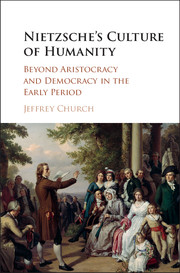Book contents
- Frontmatter
- Dedication
- Contents
- Preface
- List of abbreviations
- Introduction
- PART I The Foundation of Culture in the Early Nietzsche
- 1 The Influence of Kant and Herder
- 2 Nihilism and the Contradiction of Human Nature
- 3 Freedom and the Best Life
- Part II Two Concepts of Culture in the Early Nietzsche
- PART III The Means to Culture in the Early Nietzsche
- PART IV The Significance of the Early Period
- Bibliography
- Index
1 - The Influence of Kant and Herder
from PART I - The Foundation of Culture in the Early Nietzsche
Published online by Cambridge University Press: 05 October 2015
- Frontmatter
- Dedication
- Contents
- Preface
- List of abbreviations
- Introduction
- PART I The Foundation of Culture in the Early Nietzsche
- 1 The Influence of Kant and Herder
- 2 Nihilism and the Contradiction of Human Nature
- 3 Freedom and the Best Life
- Part II Two Concepts of Culture in the Early Nietzsche
- PART III The Means to Culture in the Early Nietzsche
- PART IV The Significance of the Early Period
- Bibliography
- Index
Summary
Nietzsche's primary concern in his early period is culture (Kultur), what it was, is, and could be. What Nietzsche means by culture, however, is unclear. It is tempting to read a contemporary meaning of culture into his texts, but such a reading would distort our understanding. To grasp his notion, we need to understand the philosophical background of his reflections on culture.
There have been many accounts of Nietzsche's philosophical context. One long-standing and influential account portrays Nietzsche as the first radical critic of modernity and of its foundation of knowledge in subjectivity. However, this “Postmodernist” Nietzsche has been challenged in recent years. Several scholars now read Nietzsche not as a critic of modernity, but rather as a reformer of modernity, as a peculiar kind of neo-Kantian. Indeed, in his early period, Nietzsche admits to his influences more readily in contrast to his late period. In the late 1860s and early 1870s, he was shaped decisively by his reading of Kant and the neo-Kantian Friedrich Albert Lange, as well as other neo-Kantians such as Afrikan Spir and Hermann von Helmholz. Recent scholarship has detailed this Kantian influence on Nietzsche's metaphysics, epistemology, and aesthetics. Unfortunately missing from this scholarship is the influence on Nietzsche's view of culture, a concept that was of great importance to the “Postmodernist” interpreters. In this book, I fill this gap.
In what follows, I argue that not only Kant but also J. G. Herder – who was also highly influential on nineteenth-century naturalism and philosophy – constitute the philosophical background for understanding Nietzsche's theory of culture. These philosophers together transformed the modern concept of culture, but they also began a debate about the nature of culture that pervaded subsequent German philosophical thought. As such, even though the young Nietzsche did not have extensive acquaintance with Kant and Herder's work, their views nonetheless framed the nineteenth-century discussions with which he was familiar.
In this chapter, I outline Kant and Herder's views of culture. In particular, I discuss three features of their views that provide good context for understanding Nietzsche. First, I examine the motivation for and purpose of culture in Kant and Herder, because their innovative understanding of this spiritual community influenced Nietzsche along with many other nineteenth-century figures. Next, I explore the basis of culture in the notion of self-determination.
- Type
- Chapter
- Information
- Nietzsche's Culture of HumanityBeyond Aristocracy and Democracy in the Early Period, pp. 13 - 29Publisher: Cambridge University PressPrint publication year: 2015



